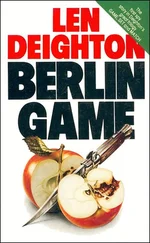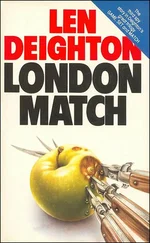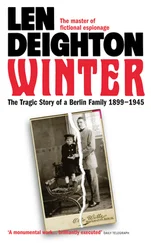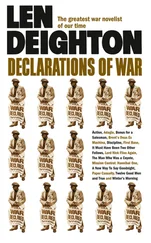Len Deighton - XPD
Здесь есть возможность читать онлайн «Len Deighton - XPD» — ознакомительный отрывок электронной книги совершенно бесплатно, а после прочтения отрывка купить полную версию. В некоторых случаях можно слушать аудио, скачать через торрент в формате fb2 и присутствует краткое содержание. Жанр: Триллер, на английском языке. Описание произведения, (предисловие) а так же отзывы посетителей доступны на портале библиотеки ЛибКат.
- Название:XPD
- Автор:
- Жанр:
- Год:неизвестен
- ISBN:нет данных
- Рейтинг книги:4 / 5. Голосов: 1
-
Избранное:Добавить в избранное
- Отзывы:
-
Ваша оценка:
- 80
- 1
- 2
- 3
- 4
- 5
XPD: краткое содержание, описание и аннотация
Предлагаем к чтению аннотацию, описание, краткое содержание или предисловие (зависит от того, что написал сам автор книги «XPD»). Если вы не нашли необходимую информацию о книге — напишите в комментариях, мы постараемся отыскать её.
XPD — читать онлайн ознакомительный отрывок
Ниже представлен текст книги, разбитый по страницам. Система сохранения места последней прочитанной страницы, позволяет с удобством читать онлайн бесплатно книгу «XPD», без необходимости каждый раз заново искать на чём Вы остановились. Поставьте закладку, и сможете в любой момент перейти на страницу, на которой закончили чтение.
Интервал:
Закладка:
‘Get my jeep, kid,’ Carson shouted to Aram Stein. To Pitman he said, ‘Get these museum pieces out of here, Lieutenant. And that’s a goddamn order. Understand?’
‘Yes, sir,’ said Pitman giving the major an exemplary salute. Carson climbed into the jeep without even looking back.
Lieutenant Pitman took off his helmet and ran a hand round the sweaty leather of its liner before putting it back on his head and tugging the chinstrap tight. He was on his own now; commanding the whole column in the face of the enemy, just as he had so often dreamed of doing. ‘There’s a soldier coming up the track,’ he said but his words were drowned by another explosion, this time from down the hill. Only Stein realized what had happened, perhaps because he had spent so much time dreading it. ‘ Aram,’ he shouted. He jumped out of the M-3 with uncharacteristic agility, and ran down the hill like a madman. ‘Don’t move, Aram. I’m coming. Stay just where you are. I’m coming, Aram. Aram!’
But Aram Stein would never move again, neither would Major Carson. The jeep had hit a Teller mine half a mile down the track, its wreckage was bent and the tyres aflame. The bodies were cruelly dismembered. ‘ Aram!’
‘Can I get you anything else?’ asked the housekeeper.
‘I’m going to have to talk to Billy,’ Stein told her. He had pampered the boy too much; he must start involving him in the real problems. Stein was tired. From now on Billy would have to help, really help.
‘Yes, Mr Stein,’ said the housekeeper, puzzled that Stein should thus confide in her. ‘Don’t forget that your telephone is still switched over to the answering machine.’
26
It was almost eight years since young Billy Stein had been in London. That visit had been with his mother and father-a special vacation to celebrate his parents’ wedding anniversary. They had taken him to all the usual tourist treats: the changing of the guard at Buckingham Palace, a visit to a musical show, a trip on the Thames, lunch at Simpson’s in the Strand, not forgetting to tip the man who carved the roast meat. It had been pleasant enough as an interlude, but London had not attracted any of the Stein family enough to make them want to return. The chilly climate, with frequent rain showers which always seemed to catch them unprepared, made them miserable, and the hotel had been neither heated nor air-conditioned. They had all sneezed, he remembered.
Little had changed since those days. The parking problem was horrendous, the taxi service inadequate, the telephones arcane and the food not to his taste. Billy Stein had spent most of his life in Southern California and now he was rarely happy anywhere else.
These factors all militated against the young Stein in his mission to London to discover, at Stein senior’s request, what Mr Paul Bock had to tell them. Even in this luxury hotel near Park Lane, Billy Stein did not find things easy. The room-service waiter was Portuguese and could not comprehend Billy’s breakfast order. The British morning newspaper was even more bewildering-devoted almost exclusively to the parochial activities of British trade union leaders, plus passionate analysis of recent British exports and some incomprehensible accounts of cricket. The headline said ‘Hanging: No by 119. MPs’ verdict in the great debate.’ He laid the newspaper aside and turned his attention to breakfast. Tinned orange juice, a smear of scrambled eggs and some shrivelled fragments of bacon. He poured the coffee and sighed deeply. Why had he let his father bully him into coming to London? He could have been eating his usual sliced fresh pineapple with real cream and good coffee, in the shade of the palm trees, looking at the map, deciding where to fly for an afternoon of swimming or surfing or skiing. He switched on the TV but got only a snow storm of static and a loud hiss. He shut his eyes and swallowed the hotel coffee.
He had still not recovered from the jet lag and the misery of his trans-Atlantic flight. The temperature of the ‘Japanese towels’ had been little different from that of the martinis with which he had tried to expunge memories of the reheated meat and vegetables that was the first-class dinner. The oppressive mediocrity of the in-flight movie was relieved only by the banal chatter of the flight crew and the sound of a passenger snoring loudly in the row ahead. Billy Stein arrived in London exhausted, and found a helpful driver who took him to his hotel for what he later discovered was nearly four times the regular taxi fare. Once in his comfortable hotel room, he slept for nineteen hours. And so it was that Billy had done nothing to contact Paul Bock until Friday-a week after the message had been left on the answering machine, and four days after Boyd Stuart’s visit to York Way.
Even on Friday Billy Stein had to make three attempts before getting the address from the secretarial agency. After a late breakfast he put on his raincoat and hat and ventured into the chilly London summer. A taxi took him to Jimmy’s Militaria and he became more and more depressed the nearer to it he came. The squalid houses and littered streets did not fit with the polite and carefully modulated voice he had heard on the recording machine.
‘Here we are, guy,’ said the taxi driver. A jumbo jet passed over so low that Billy Stein had difficulty hearing him. He held out a handful of change and let the driver help himself. The driver muttered a protest at this extra chore but helped himself anyway.
Billy Stein cupped his hands to peer beyond the ‘closed’ sign into the gloomy interior of the shop. There was an immediate incongruity in the way these slim-hipped shop window dummies, styled to look as modern as possible, capered and cavorted in the clumsy military attire of long ago. They made a weird group, these Nazis, in their dress swords and daggers, accompanying hussars and cavalry officers, dented suits of armour and a headless corporal of marines. Obviously bought secondhand, these figures bore their broken limbs, missing feet and scarred cheeks with inscrutable fortitude. It was like a morgue, thought Billy, and shivered again.
There was no answer to the bell. He looked at the lock on the shop door. It was older than most of the antiques displayed in the window. Furtively he looked up and down the street. Whether this was a hoax or not, he had no intention of coming 6000 miles without some further investigation. He used a penknife to hold the latch bolt and applied his formidable strength to the door. It creaked, strained against the woodwork and broke open with a snapping of rotten wood.
Billy Stein moved inside and closed the door, propping a large bomb against it to keep it shut. Stealthily, he picked his way between the swastika banners and the rows of breastplates, swords and guns. From upstairs he heard music: Bach played on a solo guitar. He looked inside the back room which was almost filled with cardboard boxes. Beyond them there was a cobbled yard no larger than a phone b.ooth and on the far side of it the door of an outside WC. There was a dirty sink there, spattered with red stains.
Billy Stein went back through the shop and ascended the stairs as quietly as he could. The music seemed to be coming from the floor above. At the landing he paused. The music stopped as he listened outside the door. A man’s voice said, ‘That was Bach’s Suite for Lute, No 2 in A minor, played by Carlos Bonell.’ He realized that it was a BBC announcer, coming from a radio, and turned the knob carefully to open the door.
It was a large room, looking out over the slate roof of the downstairs toilet to where a stunted little tree fought for sunshine in a yard which looked exactly the right size and shape for an execution. There was a lot of furniture in the room-several old armchairs and a large sofa with a spring visible through the torn fabric. Leaning against the fireplace were half a dozen very large, gold-painted picture frames, and a faded red sun umbrella advertising Coca-Cola. Everything smelt of cats and cooked cabbage.
Читать дальшеИнтервал:
Закладка:
Похожие книги на «XPD»
Представляем Вашему вниманию похожие книги на «XPD» списком для выбора. Мы отобрали схожую по названию и смыслу литературу в надежде предоставить читателям больше вариантов отыскать новые, интересные, ещё непрочитанные произведения.
Обсуждение, отзывы о книге «XPD» и просто собственные мнения читателей. Оставьте ваши комментарии, напишите, что Вы думаете о произведении, его смысле или главных героях. Укажите что конкретно понравилось, а что нет, и почему Вы так считаете.












